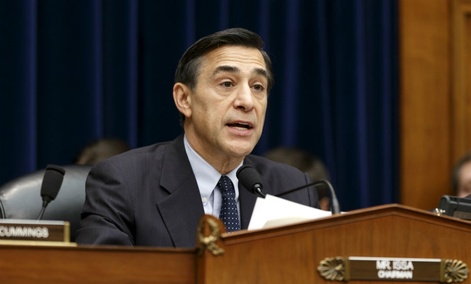The Data Act Is About to Shake Up Federal Operations
 House Oversight Committee Chairman Rep. Darrell Issa, R-Calif.
//
J. Scott Applewhite/AP
House Oversight Committee Chairman Rep. Darrell Issa, R-Calif.
//
J. Scott Applewhite/AP
This story has been updated to include industry comment.
Legislation aimed at dramatically increasing the transparency of federal spending data is on its way to President Obama’s desk after the House voted on Monday to approve a Senate-passed version of the bill.
The Digital Accountability and Transparency Act, or DATA Act, will mandate uniform coding for federal spending, so federal officials, lawmakers and watchdogs can track particular types of spending from one agency to another.
The legislation, which was modeled on spending transparency measures implemented with president Obama’s 2009 stimulus bill, will also give federal contractors and grantees a single portal to report how they’re spending taxpayer money.
The bill passed the House on a voice vote Monday afternoon.
House Oversight and Government Reform Committee Chairman Darrell Issa, R-Calif., called the DATA Act “without a doubt the most important transparency reform,” his committee has introduced during the past four years in a floor statement on Monday.
By making it easier to track federal spending, the law could save the government billions of dollars in improved performance and reduced waste and fraud, he said. Less than 1 percent of stimulus spending was lost to fraud, which is significantly lower than most government spending.
“The DATA Act is but the first shot of a technology revolution that will transform the way we govern,” he said.
Del. Eleanor Holmes Norton, D-D.C., who introduced the DATA Act for Democrats said the bill would “improve transparency and make government work better.”
Issa sponsored the House version of the DATA Act along with Oversight ranking member Elijah Cummings, D-Md. The Senate version was sponsored by Sens. Mark Warner, D-Va., and Rob Portman, R-Ohio.
The White House suggested rolling back some of the DATA Act’s transparency language in a document leaked in January, including by removing a requirement that agencies publish spending information using common data standards. Instead the White House suggested agencies use open data practices. That would have ensured spending information was publicly available but not that it was consistent across agencies.
The suggested changes were criticized by transparency groups, and Sen. Warner refused to water down the bill.
The Professional Services Council, a government contractor’s industry organization, praised the DATA Act’s passage, stating the bill “avoids broad, duplicative reporting that would have imposed significant burdens on industry.”
Other industry groups also praised the bill, including TechAmerica and the IT Alliance for Public Sector, as well as transparency groups including the Center for Data Innovation.
Legislation aimed at dramatically increasing the transparency of federal spending data is on its way to President Obama’s desk after the House voted on Monday to approve a Senate-passed version of the bill.
The Digital Accountability and Transparency Act, or DATA Act, will mandate uniform coding for federal spending, so federal officials, lawmakers and watchdogs can track particular types of spending from one agency to another.
The legislation, which was modeled on spending transparency measures implemented with president Obama’s 2009 stimulus bill, will also give federal contractors and grantees a single portal to report how they’re spending taxpayer money.
The bill passed the House on a voice vote Monday afternoon.
House Oversight and Government Reform Committee Chairman Darrell Issa, R-Calif., called the DATA Act “without a doubt the most important transparency reform,” his committee has introduced during the past four years in a floor statement on Monday.
By making it easier to track federal spending, the law could save the government billions of dollars in improved performance and reduced waste and fraud, he said. Less than 1 percent of stimulus spending was lost to fraud, which is significantly lower than most government spending.
“The DATA Act is but the first shot of a technology revolution that will transform the way we govern,” he said.
Del. Eleanor Holmes Norton, D-D.C., who introduced the DATA Act for Democrats said the bill would “improve transparency and make government work better.”
Issa sponsored the House version of the DATA Act along with Oversight ranking member Elijah Cummings, D-Md. The Senate version was sponsored by Sens. Mark Warner, D-Va., and Rob Portman, R-Ohio.
The White House suggested rolling back some of the DATA Act’s transparency language in a document leaked in January, including by removing a requirement that agencies publish spending information using common data standards. Instead the White House suggested agencies use open data practices. That would have ensured spending information was publicly available but not that it was consistent across agencies.
The suggested changes were criticized by transparency groups, and Sen. Warner refused to water down the bill.
The Professional Services Council, a government contractor’s industry organization, praised the DATA Act’s passage, stating the bill “avoids broad, duplicative reporting that would have imposed significant burdens on industry.”
Other industry groups also praised the bill, including TechAmerica and the IT Alliance for Public Sector, as well as transparency groups including the Center for Data Innovation.

No comments:
Post a Comment